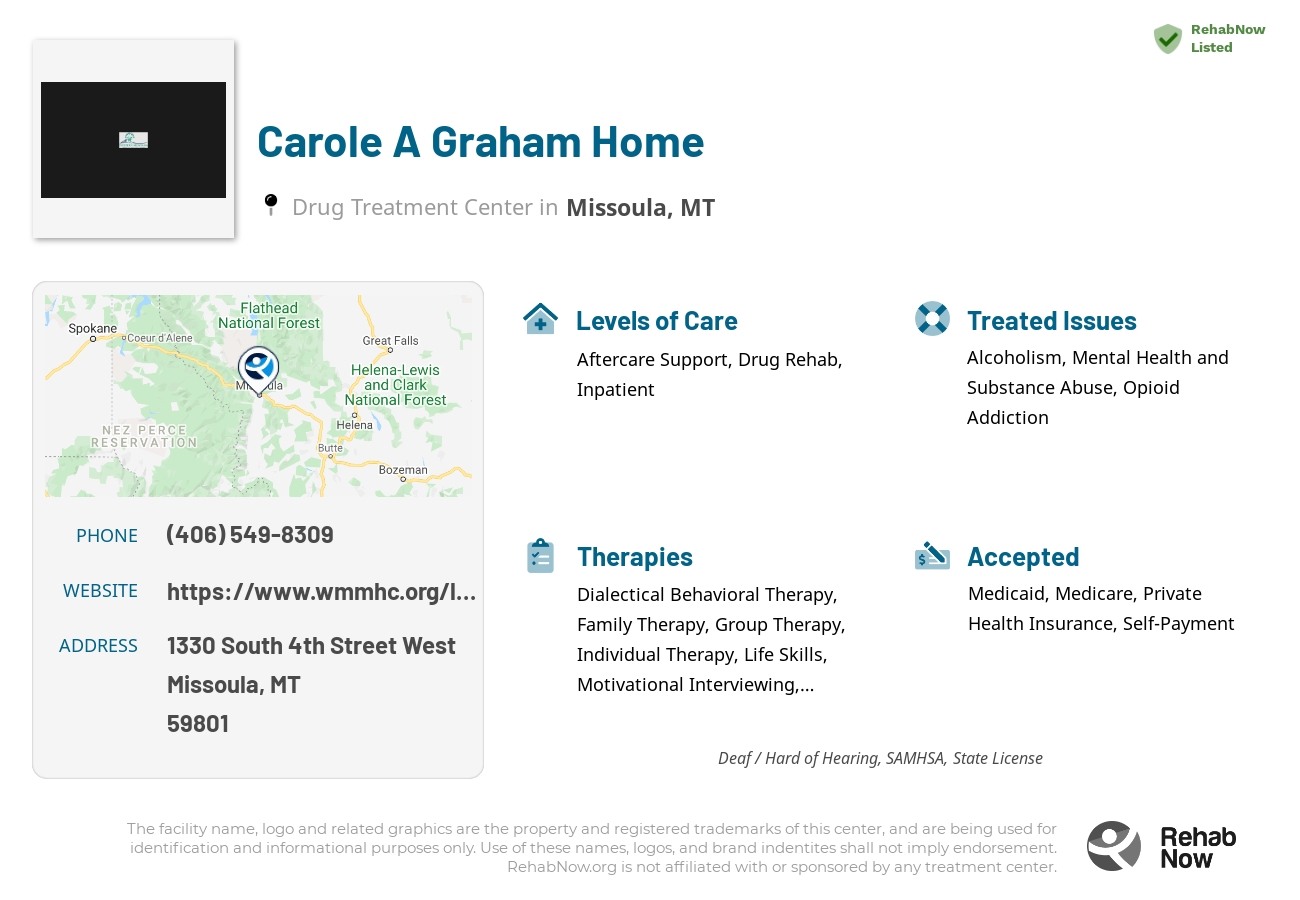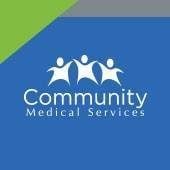Carole A Graham Home
Drug Rehab Center in Missoula, Montana
Carole A Graham Home is a licensed and nationally accredited addiction treatment facility in Montana that offers evidence-based therapies, inpatient and outpatient programs, aftercare, and sober living housing to help individuals build lasting sobriety and develop new skills for life.
About
Carole A Graham Home is a comprehensive addiction treatment facility located in Missoula, Montana. They specialize in providing individuals with effective, evidence-based therapies and treatments to help them overcome their addictions. Carole A Graham Home provides individual and group counseling, inpatient and outpatient programs, aftercare programs, and sober living housing in a supportive and compassionate environment. Their goal is to help individuals build lasting sobriety and develop new skills for life.
Carole A Graham Home offers services that help individuals understand the root causes of their addiction, learn healthier coping skills, gain knowledge to make informed decisions, and develop the values and skills needed to move forward in their recovery journey. They also provide evidence based treatments, such as Cognitive Behavioral Therapy, Dialectical Behavioral Therapy, and Motivational Enhancement Therapy. In addition to the counseling part of their treatment, Carole A Graham Home also offers comprehensive resources to support their clients in staying sober after treatment.
Carole A Graham Home is licensed by the state of Montana and is nationally accredited as a Joint Commission Accredited Addiction Treatment Facility. They strive to provide the highest quality care to their clients and have received awards in recognition of their excellent performance and outcomes. Carole A Graham Home also offers services and programs to the community, such as outreach, education, and public awareness campaigns to spread the message of addiction recovery.
Genders
Ages
Modality
Additional
Accreditations
State License
SAMHSA
Conditions and Issues Treated
Within the past decade, opioid addiction has become a nationwide epidemic. The United States hosts one of the world’s highest rates of opioid use or abuse and has one of the highest rates of opioid-related deaths. In the United States, opioid drugs are classified as Schedule II-IV controlled substances due to their highly addictive properties and potential for abuse. These include morphine, opium, heroin, oxycodone, hydrocodone, methadone, and fentanyl. Physicians usually prescribe opioids to help control pain.
Over time, opioid users develop a tolerance for the drugs, which makes it difficult, if not impossible, to function without them. In turn, opioid users often resort to illicit means of obtaining the drugs. These means can include drug dealers, friends, and family members who do not have legitimate prescriptions for the drugs. Opioid addiction can quickly lead to heroin use, especially those seeking more intense highs than prescription opioids offer. Due to the high risk of overdose, heroin users are at a much higher risk for illness and death.
Levels of Care Offered
This center offers a variety of custom treatment tailored to individual recovery. Currently available are Aftercare Support, Drug Rehab, Inpatient, with additional therapies available as listed below.
Inpatient treatment centers offer a safe, secure, and often medically supervised environment for drug or alcohol-addicted individuals. Many of these facilities are equipped to provide detoxification, treatment for co-occurring mental health disorders, and aftercare programs.
The patient typically spends 28 to 30 days at the facility and will receive extensive drug counseling. They will also learn how to live without drugs and how to make the right decisions in life.
Recovering drug addicts need aftercare support when they leave treatment. The support can include guidance through 12-step programs, outpatient rehabilitation programs, and support groups. Aftercare supports the individual in their desire to maintain sobriety by reducing relapse risk with positive choices.
The success of drug treatment does not end when the addict leaves the rehabilitation center. There is no such thing as a “one and done” type of rehabilitation process. Recovery is a lifelong journey that begins with treatment and continues by the addict committing to outside support groups or drug rehab programs.
When choosing a program, it is crucial to choose one that will provide long-term aftercare support. This ensures that you have the tools you need to sustain your recovery.
Therapies & Programs
Individualized Treatment is essential because it gives addicts the ability to participate in a program that meets their unique needs. An addict should work with professionals who understand what they’re going through, especially if the addict is actively using. Finding the right treatment program for an addict is difficult, but it’s even harder without communicating with those who have experience treating your specific situation.
The therapies typically involve all family members, potentially including siblings, children, and parents who play a role in their daily lives. These sessions can be essential because they address past issues that may have affected an addict or alcoholic’s recovery process. They provide support during this time when it is needed most!
A family therapy session, often called a family meeting or intervention, is a necessary process that helps loved ones of addicts see their situation in a new light. It’s also one of the most challenging things families will ever have to do when they’re facing a loved one battling addiction or alcoholism.
Group therapy sessions provide recovering addicts with a chance to cope with everyday situations that many face. Group therapy sessions are held in rehab facilities, clinics, churches or community centers that offer drug addiction treatment.
People who attend these groups are encouraged to voice their feelings and support other addicts in recovery. This helps group members strengthen their own recovery program while cheering on others who are struggling with sobriety.
Trauma therapy allows them to work through past trauma to have peace of mind and begin down the road of sobriety. The therapist will work with the individual to help them understand their past and present relationships. Patients may often believe that something is inherently wrong with them or they are unworthy of love. The therapist aims to correct these negative feelings and behaviors by helping the person realize that their actions do not reflect who they truly are.
Dialectical behavior therapy, or DBT, is one form of cognitive behavioral treatment. This type of therapy typically involves both individual and group sessions with a therapist on a regular basis.
It uses concepts like mindfulness training to help addicts learn how to identify their thoughts, feelings, behaviors and the experiences that trigger them so they can avoid relapse. DBT also teaches addicts how to regulate their emotions, which can make it easier for them to avoid or overcome negative thoughts and cravings.
Cognitive Behavioral Therapy (CBT) is a highly effective treatment option based on the idea that how we feel, think and act all interact together. Our thoughts determine our feelings and behaviors; our feelings affect our thoughts, and our behaviors change our thoughts and feelings. CBT helps people explore their thoughts for problems (or false beliefs) that influence their mood and actions. By examining their thoughts and beliefs, people can recognize distorted or irrational and modify them to more realistic, positive ones. CBT is very goal-oriented, which means that the therapist and patient work together on a specific problem while learning to become more adept at solving future problems.
CBT works well with a broad range of people, including those with depression, anxiety disorders, eating disorders, and problems with anger. In addition to helping a client focus on thoughts that can be changed, CBT also allows them to take an active role in their treatment. This is called a collaborative approach because both patient and therapist work together to produce the best possible results.
CBT is based on cognitive learning theory, which says that our behavior is a learned response to our environment. Cognitive refers to thoughts and beliefs, while behavioral relates to actions or deeds. CBT helps people learn ways of behaving to improve their quality of life by focusing on specific problems or goals they want to achieve. Sometimes, CBT is used alone; other times, it is combined with medications or brief counseling techniques such as solution-focused and motivational interviewing to achieve optimal results for the patient.
Life skills training is beneficial for addicts in recovery because it helps them learn how to take care of themselves and improve their quality of life, which can promote feelings of purpose and motivation.
This works by teaching individuals life-enhancing skills that support positive living, including:
- Healthy lifestyle habits
- Skills to effectively manage stress
- Effective communication skills to help them get their needs met without turning to drugs or alcohol
- Money management and budgeting skills so they can continue to take care of themselves after treatment ends.
Payment Options Accepted
For specific insurance or payment methods please contact us.
Is your insurance accepted?
Ask an expert, call (888) 674-0062
Western Montana Mental Health Center Associated Centers
Discover treatment facilities under the same provider.
- Western Montana Mental Health Center - Hays Morris House in Butte, MT
- Western Montana Mental Health Center - Dakota Place in Missoula, MT
- Western Montana Mental Health Center - Riverfront Center in Hamilton, MT
- Western Montana Mental Health Center - Psychiatric Services - West Park Street in Butte, MT
- Western Montana Mental Health Center - Sanders County in Thompson Falls, MT
Learn More About Western Montana Mental Health Center Centers
Additional Details
Specifics, location, and helpful extra information.
Missoula, Montana 59801 Phone Number(406) 549-8309 Meta DetailsUpdated November 25, 2023
Staff Verified
Patient Reviews
There are no reviews yet. Be the first one to write one.
Missoula, Montana Addiction Information
Montana has one of the highest rates of drug and alcohol abuse in the nation. More than 280,000 of its residents engage in drug or alcohol abuse every year. Marijuana, in particular, is heavily used among high school students. Despite these daunting trends, the state is grappling with the issue head-on.
Missoula has a rate of overdose deaths higher than the national average. In Missoula, there are about 15.8 overdose deaths per 100,000 residents annually. In 2012, there were 726 cases of drug-related hepatitis in Missoula. Methamphetamine and cocaine are also common drug choices among citizens of Missoula, MT. It is important to consider the type of treatment that will be most effective for you or the person you love.
Treatment in Nearby Cities
- Fort Harrison, MT (92.4 mi.)
- Glendive, MT (439.1 mi.)
- Wolf Point, MT (400.4 mi.)
- Cut Bank, MT (145.3 mi.)
- Great Falls, MT (135.1 mi.)
Centers near Carole A Graham Home
The facility name, logo and brand are the property and registered trademarks of Carole A Graham Home, and are being used for identification and informational purposes only. Use of these names, logos and brands shall not imply endorsement. RehabNow.org is not affiliated with or sponsored by Carole A Graham Home.







